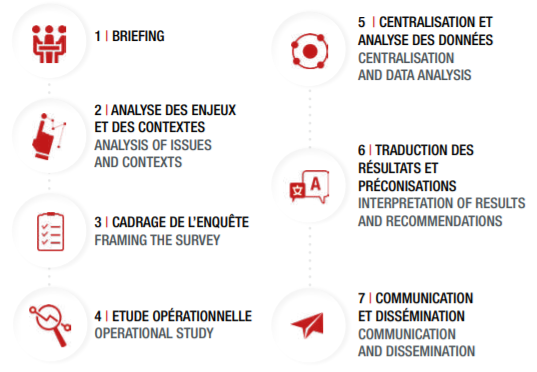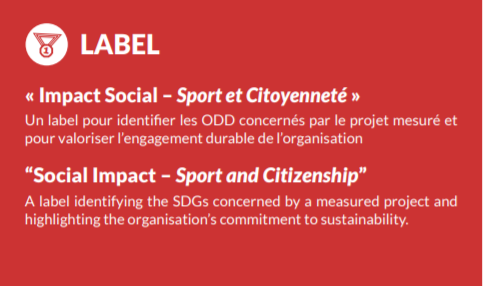Measuring the social impact of sport : the commitment of Sport and Citizenship
For thirteen years, the mission of our Think Tank has been to study, assess and promote the social role of sport in France and Europe. We are profoundly convinced that sport is a lever for social transformation and a real driving force for change. The challenge we face today is to provide tangible proof of this.
 Julian JAPPERT
Julian JAPPERT
Director general
Sport and Citizenship Think Tank
The impact of sport on society is often praised and sometimes made use of, even when the notion has not been clearly defined nor the impact identified. As activists committed to promoting sport in society, we are very pleased to have been involved, at our level, in working for this recognition, while constantly warning about the dangers of a sort of “magic” thinking which sees sport as, by definition, virtuous. Sport itself is neither good nor bad; it is the people working in sport, embodying the values attributed to it, who can make it a tool for strong added value and even make a positive contribution to the challenges facing society.
Sport can therefore have multiple effects on society, defined by the French High Council for the social and solidarity economy “all the consequences (developments, changes and break ups) of an organisation’s activities on direct or indirect external stakeholders (beneficiaries, users and clients) in its area, on people within the organisation (employees, volunteers) and on society in general.”
In our view, an awareness of this, and an ability to measure the impact represent an important resource which is, unfortunately, not yet sufficiently explored in the sport sector. It therefore seemed to us relevant to suggest a method for accurately measuring the external effects – positive or negative – produced by sport, and to offer its different stakeholders a framework of interpretation.
This kind of approach has several advantages.
“Identify the social added-value of sport”
It allows stakeholders in sport to measure the impact of their project in more detail, to highlight their actions, and generate support and greater involvement from the general public and policy makers. It also makes it possible to provide concrete factors which can help political and sporting bodies in their decision making, by demonstrating the social utility of investments made, and aiming for a multiplier effect. It also allows projects to be modified and developed to make them more effective for their beneficiaries, ensuring a positive impact on regions and their inhabitants and guaranteeing their long-term use. Lastly, it can encourage and help orientate public and private investment in sport by giving legitimacy, and by giving meaning to the commitment, by bringing stakeholders together around such projects and strengthening CSR/OSR policies.
Over the last few years we have seen a gradual increase in our partners’ need to have tools at their disposal for evaluating the social added value created by sport. A dialogue has opened with academic researchers (particularly the University of Rennes VIPS2 laboratory, which has contributed to this dossier), acknowledging the starting point of our reflections, now made operational through the development of measuring tools which can be put into practice.
The measuring method we propose is for all the stakeholders using sport to address social problems, from organisers of major sporting events, operators in the sport movement (federations, leagues, clubs, associations), economic stakeholders (advertisers, foundations and other funders), and organisations for social utility, to the public authorities (the State and local authorities).
“A method which is skilful, flexible and useful”
This method sees itself as skilful, flexible and useful.
- Skilful in that it will explore the topic(s) raised by the study subject in precise detail; it will identify problems and define reliable, relevant indicators. The methodology is based on the Think Tank’s expertise, backed up by the scientific opinion of one or more specialists in the field(s) studied.
- Flexible in that it aims to adapt itself to the sponsors’ budgetary and time constraints, as well as to their interpretation of impact measuring. In every case, the sponsors will be involved in defining the objectives of the impact measuring, the expectations, the timescale and the budget available. These indications will clarify the choice of methodological tools proposed, in order to identify the most relevant to meet the needs of those involved.
- Useful in that it aims to be easy for everyone to read and understand. Above all, it offers an interpretation and analysis of the results which can immediately be put to practical use by the sponsors. Sport and Citizenship’s approach is closer to “action-research” than to a purely statistical analysis.
The demands for methodological flexibility will in no case compromise the prerequisite for scientific rigour. Scientific accuracy remains fundamental to Sport and Citizenship’s approach. This is shown by the correct, rigorous use of tools validated by the specific scientific fields (sociology, social psychology, STAPS and so on). The aim is to choose those best adapted to the methodological demands of each study, and to put them together in a complementary, fully coherent way in order to avoid epistemological pitfalls.
Several impact measurement schemes have already been initiated, with stakeholders from different spheres: social (Emmaüs Solidarité), sporting (Paris Athlé 2020), economic (EDF), and public (Loire-Atlantique Departmental Council, Pays de la Loire Regional Council). In this revue you will find an overview of these very varied programmes which will confront our innovative approach with the different realities and issues.
To sum up, the measuring scheme presented here falls into the two main missions conducted by Sport and Citizenship since its inception: advocacy and support for decision-making.
At a moment when we are faced with numerous challenges and the world afterwards needs to be considered and (re)constructed, we aim to use proof to contribute to reinforcing sport’s place in society.
Our method :









 INSCRIPTION
INSCRIPTION CONTACT
CONTACT FACEBOOK
FACEBOOK